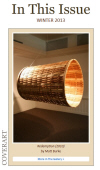Literal Latte – Winter 2013
The feel and writing of Literal Latte, a magazine that has been “serving up a stimulating brew since 1994,” are authentic. All of the work is quality and well worth the read. And what’s even better is that this issue features contest winners—the best of the best.
The feel and writing of Literal Latte, a magazine that has been “serving up a stimulating brew since 1994,” are authentic. All of the work is quality and well worth the read. And what’s even better is that this issue features contest winners—the best of the best.
Mary Heather Noble takes second prize for the 2012 Literal Latte Essay Award with “Luffing.” Using her memories of sailing and rich language, Noble illustrates her family’s dynamics. All her father wants to do is sail, but her mother doesn’t want to have anything to do with it. Noble goes often with her father, but eventually grows out of it, choosing sports in high school instead. But even as she gets closer with her mother—seeing her father in new eyes—she continues to sail when her father asks her to: “When we come back, it’s always late, sometimes even long past our dinner. My mother asks me how it went. I shrug, wary of what she’ll say when I like it, fearful of what my father will think when I don’t.” Although an excellent essay already, I think it would have been better if she used less memories, as some of them seemed to make the same illustration.
Annita Sawyers’s piece, “The Other Chair,” is a braid essay. On one strand we see Sawyers as a young schizophrenic patient in a ward, and the other strand shows her years later, again at a ward, but this time as a psychologist. The scenes illustrate her struggle to impress and to let go of her past:
In a small, quiet space, deep within my mind, I was thinking about the young woman I’d pictured for so long as a psychiatric patient, wondering if I was ready to leave that image behind. Could I call myself a psychologist now? Had I indeed become a psychiatric doctor?
There is no doubt that this piece should have (and did) win first prize.
Judith Slater’s piece takes first in the short short section, telling the story of a cashier/sometimes-psychic. But this psychic doesn’t see into the future; she sees into the past. Through talking about seeing into the past of her customers, the narration lends itself toward some excellent thoughts about the past in general:
With a past life, everything is over — the bad choices, the missed opportunities. No more mistakes to make. There’s a comfort in that. . . .
Maybe it’s a good thing to have a past you can’t remember, instead of a past you can’t forget. . . .
How could I go back to a past life without someone I trust, someone like me, to guide me through the journey and bring me back safe and whole? It’s not something you can do alone.
I read Susan Cohen’s “Birding by Ear,” which won first place in poetry, several times. In this narrative poem, the narrator and her husband attend an adult class in which he tells the young, “slim, blonde” about his job as a kid: shooting the birds that would eat the cherry crop.
In their taxonomy, the avian kingdom
divided neatly into damned Cherry Eaters
and birds allowed to live.
A Cherry Eater chirped, and he ran to the orchard.
He plugged thousands at a nickel apiece,
bounty hunter, .22 slung
where now he hefts a spotting scope and aims
at nothing more than magnification.
Be sure also to read third prize in essays (“Kritios Boy” by Nancy Ludmerer), third prize in fiction (“Mistaken Identity” by Enid Harlow), and the rest of the poetry selection with writing from Gregory Loselle, Tracy DeBrincat, Clara Changxin Fang, and Denton Loving.
[www.literal-latte.com]






